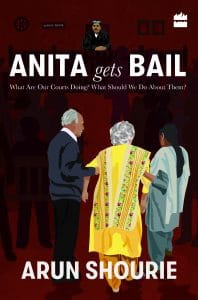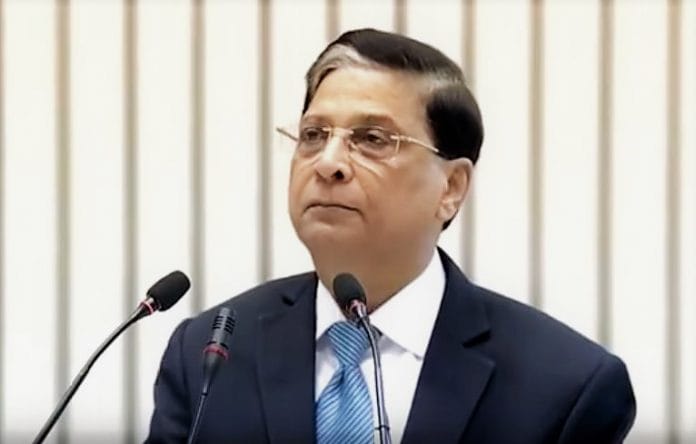In this excerpt from his book ‘Anita Gets Bail’, Arun Shourie writes about the grandiloquence that is often part of Chief Justice of India Dipak Misra’s past judgements.
Alas! Grandiloquence still bursts forth from time to time. The opening paragraph of the judgment of Justice Dipak Misra in the defamation case has often been cited in this context, and many a passage from it has become famous. The question at hand was whether defamation is just a civil offence against an individual or,in addition, is it a criminal offence: in the sense, in part because the person defaming another deserves, in addition to paying a fine, to be jailed; and in part because defamation disrupts social relations and is thus a crime against society and state as a whole. Justice Misra opened his exposition thus:
This batch of writ petitions preferred under Article 32 of the Constitution of India exposits cavil in its quintessential conceptuality and percipient discord between venerated and exalted right of freedom of speech and expression of an individual, exploring manifold and multilayered, limitless, unbounded and unfettered spectrums, and the controls, restrictions and constrictions, under the assumed power of ‘reasonableness’ ingrained in the statutory provisions relating to criminal law to reviver and uphold one’s reputation. The assertion by the Union of India and the complainants is that the reasonable restrictions are based on the paradigms and parameters of the Constitution that are structured and pedestaled on the doctrine of non-absoluteness of any fundamental right, cultural and social ethos, need and feel of the time, for every right engulfs and incorporates duty to respect [the] other’s right and ensure mutual compatibility and conviviality of the individuals based on collective harmony and conceptual grace of eventual social order; and the asseveration on the part of the petitioners is that freedom of thought and expression cannot be scuttled or abridged on the threat of criminal prosecution and made paraplegic on the mercurial stance of individual reputation and of societal harmony, for the said aspects are to be treated as things of the past, a symbol of [the] colonial era where the ruler ruled over the subjects and vanquished concepts of resistance; and, in any case, the individual grievances pertaining to reputation can be agitated in civil courts and thus, there is a remedy and viewed from a prismatic perspective, there is no justification to keep the provision of defamation in criminal law alive as it creates a concavity and unreasonable restriction in individual freedom and further progressively mars voice of criticism and dissent which are necessitous for the growth of genuine advancement and a matured democracy.
The judge moved to recapitulating the submissions that the counsel had made to the court: ‘We may immediately state that the effort would be to record the submissions in fullest, may be [sic] sans elaborations and individualistically crafted and sculptured nuances during the oral hearings…’ Paragraphs followed summarizing the arguments of the counsel who argued that defamation is just a civil wrong against a person, and not a crime against the state. And this was followed by a section that set out what Justice Misra characterized as ‘Proponements In Oppugnation’. And so on. Yet, such flights of eloquence are to a pattern. In Manoj Nirula v. Union of India, the petitioner had urged that no one who is guilty of a heinous crime should be allowed to be inducted into the Council of Ministers. Justice Misra opened his oration with customary eloquence:
A democratic polity, as understood in its quintessential purity, is conceptually abhorrent to corruption and, especially corruption at high places, and repulsive to the idea of criminalization of politics as it corrodes the legitimacy of the collective ethos, frustrates the hopes and aspirations of the citizens and has the potentiality to obstruct, if not derail, the rule of law. Democracy, which has been best defined as the Government of the People, by the People and for the People, expects prevalence of genuine orderliness, positive propriety, dedicated discipline and sanguine sanctity by constant affirmance of constitutional morality which is the pillar stone of good governance.
Priyanka Srivastava and Ors. v. State of U.P. dealt with persons who had borrowed from the Punjab National Bank and, instead of returning the loans, had begun filing cases against officials of the bank. Justice Misra began:
The present appeal projects and frescoes a scenario which is not only disturbing but also has the potentiality to create a stir compelling one to ponder in a perturbed state how some unscrupulous, unprincipled and deviant litigants can ingeniously and innovatively design in a nonchalant manner to knock at the doors of the Court, as if, it is a laboratory where multifarious experiments can take place and such skillful persons can adroitly abuse the process of the Court at their own will and desire by painting a canvas of agony by assiduous assertions made in the application though the real intention is to harass the statutory authorities, without any remote remorse, with the inventive design primarily to create a mental pressure on the said officials as individuals, for they would not like to be dragged to a court of law to face in criminal cases, and further pressurize in such a fashion so that financial institution which they represent would ultimately be constrained to accept the request for ‘one-time settlement’ with the fond hope that the obstinate defaulters who had borrowed money from it would withdraw the cases instituted against them. The facts, as we proceed to adumbrate, would graphically reveal how such persons, pretentiously aggrieved but potentially dangerous, adopt the self-convincing mastery methods to achieve so. That is the sad and unfortunate factual score forming the fulcrum of the case at hand, and, we painfully recount.
In the course of the judgment we learn of ‘…the respondent No. 3 possibly nurturing the idea of self-centric Solomon’s wisdom…’; we are taken through a matter that seems somewhat removed from the issue at hand, only to learn, ‘…Though the present controversy is different, we have dealt with the said facet as we intend to emphasize how the Courts have dealt with and addressed to such a matter so that a borrower with vengeance could ultimately exhibit his high-handedness…’; we learn that ‘…Presently, we are required to sit in the time machine for a while’; we learn how ‘… At this stage, it is apposite to state that the third respondent, if we allow ourselves to say so, have [sic] possibly mastered how to create a sense of fear in the mind of the officials who are compelled to face criminal cases’, in fact that ‘…The labyrinth maladroitly created by the respondent No.3 does not end here. It appears that he had the indefatigable spirit to indulge himself in the abuse of the process of the Court’; we then learn about ‘the devilish design of respondent No. 3’; we are reminded that ‘When a citizen avails a loan from a financial institution, it is his obligation to pay back and not play truant or for that matter play possum’—do possums, transfixed by the glare of headlights, play truant, you are left wondering…
 This excerpt from ‘Anita Gets Bail’ has been published with permission from HarperCollins
This excerpt from ‘Anita Gets Bail’ has been published with permission from HarperCollins








Is Dipak Misra related to Shashi Tharoor in any way?
You say eloquence, I say verbal diarrhoea.
Such prolixity suggests an underlying inferiority complex, among other things.
Somebody should give the man a copy of Orwell’s collected works.
We were taught at school (when appearing for the Senior Cambridge examination) that the effort should be to use the simplest possible language. We should construct simple sentences without too many sub-clauses.
The objective was to enable the reader to understand easily what was sought to be conveyed. That is the way it works best.
Even India’s new poet laureate, Prasoon Joshi, would struggle to keep up with such soaring rhetoric.